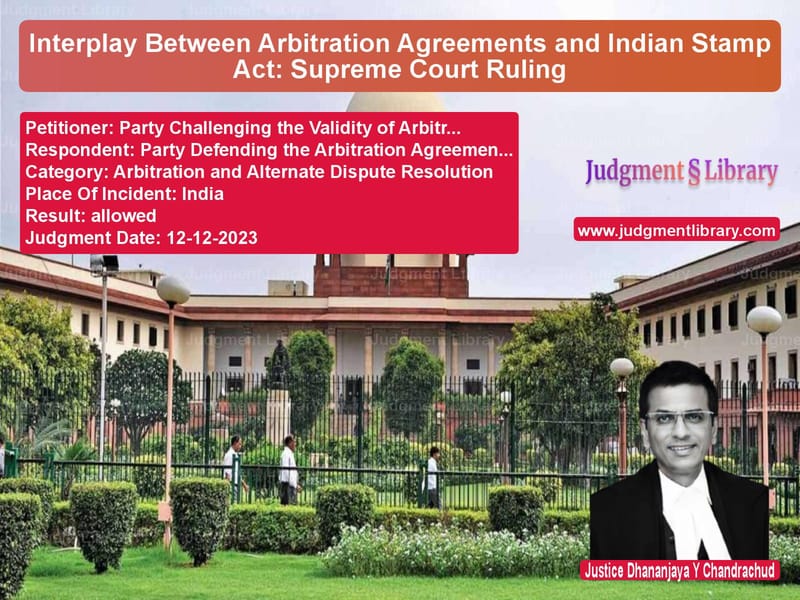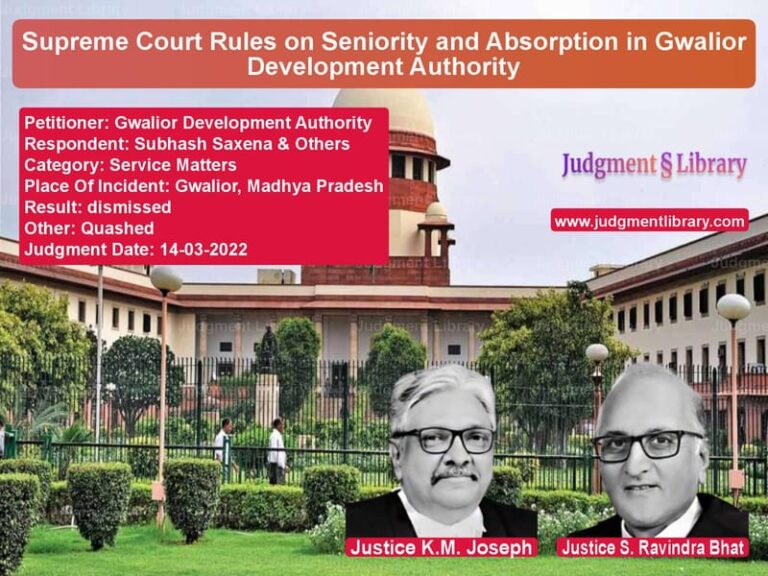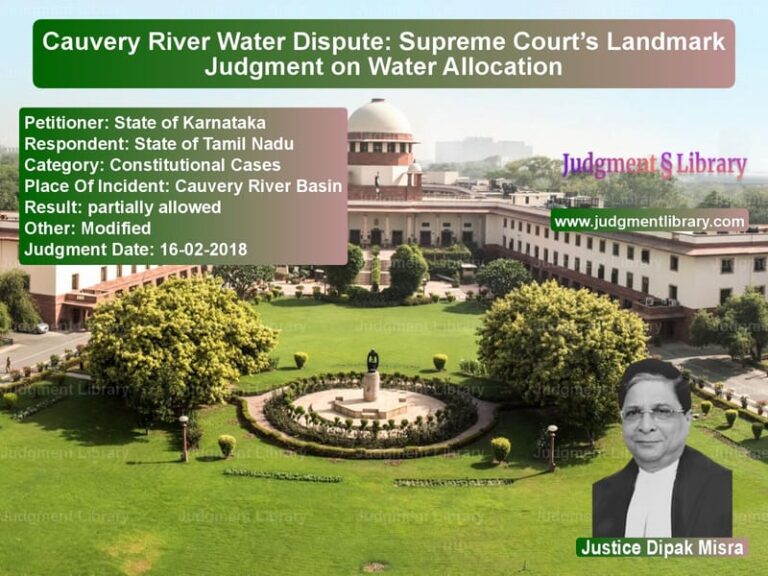Interplay Between Arbitration Agreements and Indian Stamp Act: Supreme Court Ruling
The Supreme Court of India recently addressed a significant legal issue regarding the relationship between the Arbitration and Conciliation Act, 1996, and the Indian Stamp Act, 1899. This case explored whether an arbitration agreement contained within an unstamped instrument remains valid, or whether it is deemed unenforceable pending the payment of stamp duty. The seven-judge bench, led by Chief Justice Dr. Dhananjaya Y. Chandrachud, sought to reconcile the provisions of these two statutes while minimizing judicial interference in arbitration matters. The ruling provides clarity on how the courts must handle arbitration agreements when issues relating to stamp duty are raised, ensuring that technicalities do not unduly disrupt the arbitration process.
At the heart of this judgment is the principle of competence-competence, which affirms the arbitral tribunal’s authority to decide on its own jurisdiction, including matters related to the existence and validity of the arbitration agreement. The Court reaffirmed the separability doctrine, indicating that an arbitration agreement remains effective even if the underlying contract is unstamped or not in compliance with the Stamp Act.
Petitioner’s Arguments
The petitioner, challenging the earlier decision in N N Global 2, contended that the arbitration agreement should not be rendered void merely due to non-payment of stamp duty. The petitioner’s counsel argued:
- The court’s role in Section 11(6A) of the Arbitration Act is limited to examining whether an arbitration agreement exists, not its validity or enforceability.
- The separability principle ensures that the arbitration clause remains effective even if the underlying contract is unstamped or defective in some manner.
- Sections 33 and 35 of the Stamp Act should not interfere with arbitration proceedings. Disputes related to stamp duty should be resolved by the arbitral tribunal.
- Judicial interference during the Section 11 stage is unwarranted, as it defeats the purpose of the Arbitration Act, which aims to reduce court involvement in arbitration matters and facilitate quicker resolution of disputes.
Respondent’s Arguments
The respondents, defending the ruling in N N Global 2, put forth the following arguments:
- The Stamp Act makes unstamped documents inadmissible, and courts are bound to adhere to this provision.
- The court, under Section 11, has an obligation to ensure that the arbitration agreement complies with all statutory requirements, including payment of stamp duty, before appointing an arbitrator.
- Failure to pay stamp duty is not a mere defect but a legal bar, and no court or tribunal should proceed with the arbitration until the necessary duty is paid.
- Allowing unstamped agreements to proceed to arbitration would undermine the objectives of the Stamp Act, particularly its role in revenue collection and regulating documents.
Supreme Court’s Decision
The Supreme Court overruled the decision in N N Global 2 and delivered the following key findings:
- Non-payment of stamp duty does not render an arbitration agreement void but makes it unenforceable until the stamp duty is paid.
- The arbitral tribunal has jurisdiction to address issues of stamping and can impound documents as per Section 33 of the Stamp Act.
- Court intervention at the referral stage should be minimal, confined to a preliminary examination of the existence of the arbitration agreement.
- The legislative intent of Section 11(6A) of the Arbitration Act is to ensure that the tribunal, rather than the court, decides on jurisdictional objections, including objections related to stamping.
- The separability doctrine and competence-competence principle must be upheld to avoid delays and unnecessary judicial interference in the arbitration process.
Conclusion
This judgment strengthens the principle of minimal judicial interference in arbitration and clarifies that technical issues related to stamp duty should not automatically invalidate an arbitration agreement. The ruling emphasizes that arbitration agreements are separate from the underlying contracts and that disputes regarding stamping must be resolved by the arbitral tribunal. This decision provides a balanced approach to arbitration, facilitating its growth as an effective dispute resolution mechanism in India while respecting the requirements of the Stamp Act.
Petitioner Name: Party Challenging the Validity of Arbitration Agreement.Respondent Name: Party Defending the Arbitration Agreement.Judgment By: Justice Dhananjaya Y Chandrachud.Place Of Incident: India.Judgment Date: 12-12-2023.
Don’t miss out on the full details! Download the complete judgment in PDF format below and gain valuable insights instantly!
Download Judgment: party-challenging-th-vs-party-defending-the-supreme-court-of-india-judgment-dated-12-12-2023.pdf
Directly Download Judgment: Directly download this Judgment
See all petitions in Arbitration Awards
See all petitions in Dispute Resolution Mechanisms
See all petitions in Arbitration Act
See all petitions in Enforcement of Awards
See all petitions in Institutional Arbitration
See all petitions in Judgment by Dhananjaya Y Chandrachud
See all petitions in allowed
See all petitions in supreme court of India judgments December 2023
See all petitions in 2023 judgments
See all posts in Arbitration and Alternate Dispute Resolution Category
See all allowed petitions in Arbitration and Alternate Dispute Resolution Category
See all Dismissed petitions in Arbitration and Alternate Dispute Resolution Category
See all partially allowed petitions in Arbitration and Alternate Dispute Resolution Category







